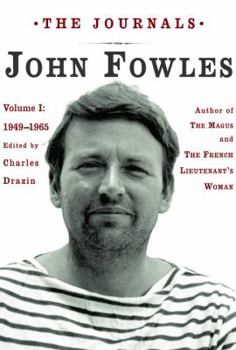The Journals: 1949-1965
Select Format
Select Condition 
Book Overview
John Fowles gained international recognition in 1963 with his first published novel, The Collector, but his labor on what may be his greatest literary undertaking, his journals, commenced over a... This description may be from another edition of this product.
Format:Hardcover
Language:English
ISBN:1400044316
ISBN13:9781400044313
Release Date:May 2005
Publisher:Alfred A. Knopf
Length:668 Pages
Weight:2.50 lbs.
Dimensions:1.7" x 6.6" x 9.4"
Customer Reviews
3 ratings
Essential and Under-recognized
Published by Thriftbooks.com User , 14 years ago
These are diaries which all novelists should read, and they are the greatest work of literature contributed by John Fowles. His capacity to disarm complex thought into readable sentences reveals itself here more than in any of his novels, and we can perceive by the casual witticisms, observations on art, and brilliant descriptions of nature a powerful creative mind thrashing against its boredom with society. Fowles finds refuge in his garden, and occasionally in his wife Elizabeth, but the general tone of his entries over the entire course of his life is one of poisoned dissatisfaction with human affairs. He attacks everything he sees. The diaries rise above vitriol because they are so well written -- their length and detail create an intimacy excluded from the plot-based novel form, and by the end of their first year our identification with their author is almost complete. Without explicit instruction, they show how he was able to create works like "The Magus" by producing the total catalogue of raw materials that went into that book, and by revealing the astonishing sensitivity with which John Fowles experienced the world. There are few modern diaries that are so detailed or complete, regularly updated from the college years to the beginning of senescence: these are not only a skeleton key to Fowles's works but the complete marrow of his brain.
John Fowles' last novel.
Published by Thriftbooks.com User , 14 years ago
I was blown away by the two volumes of John Fowles' journals. They are an amazing account, of the man's life, of his decision to become a writer and of the process he followed to make it happen. If you are a fan of Mr. Fowles' work, then you will enjoy reading these volumes as much as you enjoyed his novels. In fact, Mr. Fowles considered the journals to be his last novel. This book will also be of interest to anyone with an eye on beginning their own career as a writer. In addition to giving invaluable insights into the creative process that went into works such as "The Magus", "The French Lieutenant's Woman" and "Daniel Martin", it also paints a picture of the struggle and the business of making a living from writing fiction. I loved "The Journals of John Fowles" and look forward to dipping into them again and again.
Controversial Genius
Published by Thriftbooks.com User , 17 years ago
The editorial review pretty much nails it. Breathless prose, mostly to do with nature and gardening. A lot of scientific names of plants cultivated in Fowles's garden. He doesn't provide much insight into his writing process. He writes and writes about how much time he spends working on each book but how do his characters come ALIVE, that's what got me interested in his journals in the first place, but the answers aren't there (as if he knew his personal stuff would be read and published afterwards). There are occasional splashes of anger. Following the news of the fatwa issued against Salman Rushdie, Fowles writes: "Everyone falls over themselves to avoid the truth: that most Muslims are very primitive people and can't be treated as sophisticated ones. If you endlessly prod a tiger, of course its claws will flash out. And all this forces us, on behalf of the principle, to volunteer to be martyrs. Absurd." (14 February 1989). Writing about his occasional meetings with Ian McEwan, Fowles doesn't offer any private glimpses into his fellow-writer's personality. Mentioning Kazuo Ishiguro's THE REMAINS OF THE DAY, he concludes his entry with a mere "I liked it." Apparently, he hated Charlotte Rampling. After viewing THE NIGHT PORTER with his wife and friends he told them that the "creature" can't act. Funny how she went on to become one of the most celebrated actresses of the British (as well as international) cinema. The film itself, Fowles thought, was interesting but filthy. At times, Fowles angrily denounces homosexuality, then writes (after having been visited by two gay friends at his lonely house), "Thank god for homosexuals!" All in all, interesting stuff. The endless descriptions of his flowers and plants can sometimes become repetitive and boring, but since I love nature and gardening almost as much as Fowles himself, it didn't annoy me that much. The editorial review mentions something about his relationship with his wife. That, perhaps, forms the core of the journal. Some pages felt like they were straight out of Ingmar Bergman's SCENES FROM A MARRIAGE. Nothing scandalous though. A lot more interesting than Volume I. Check it from your local library before buying though (which is what I did), as it might prove to be quite different from what you expected.





